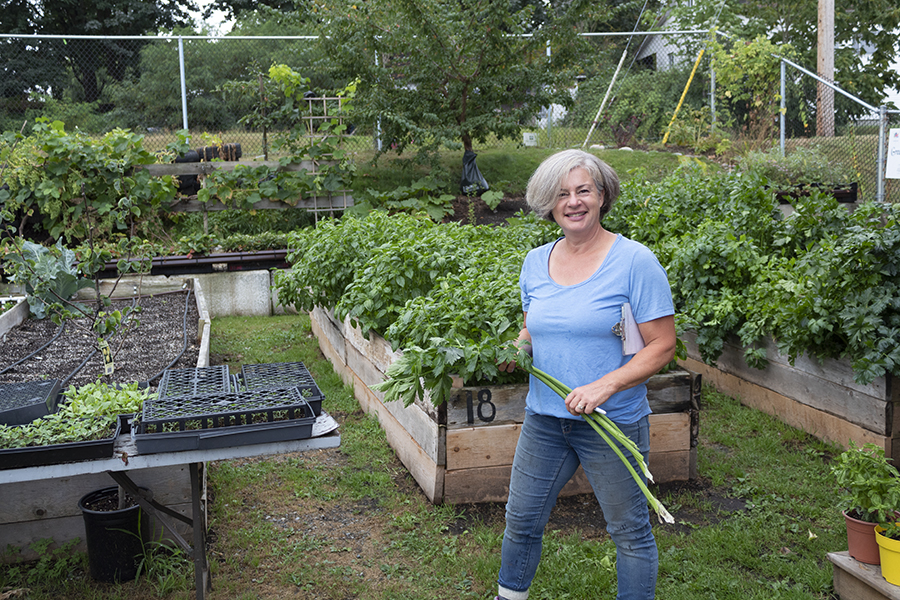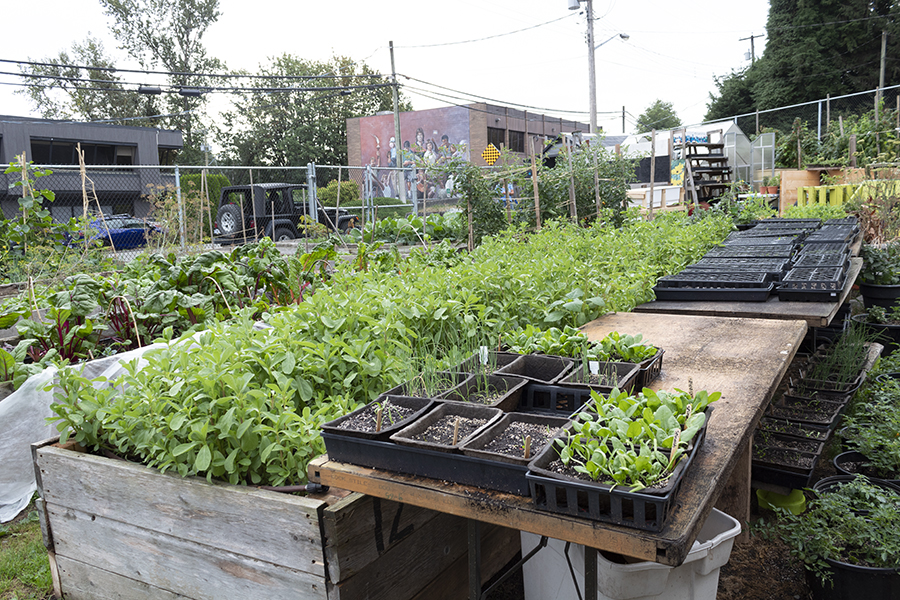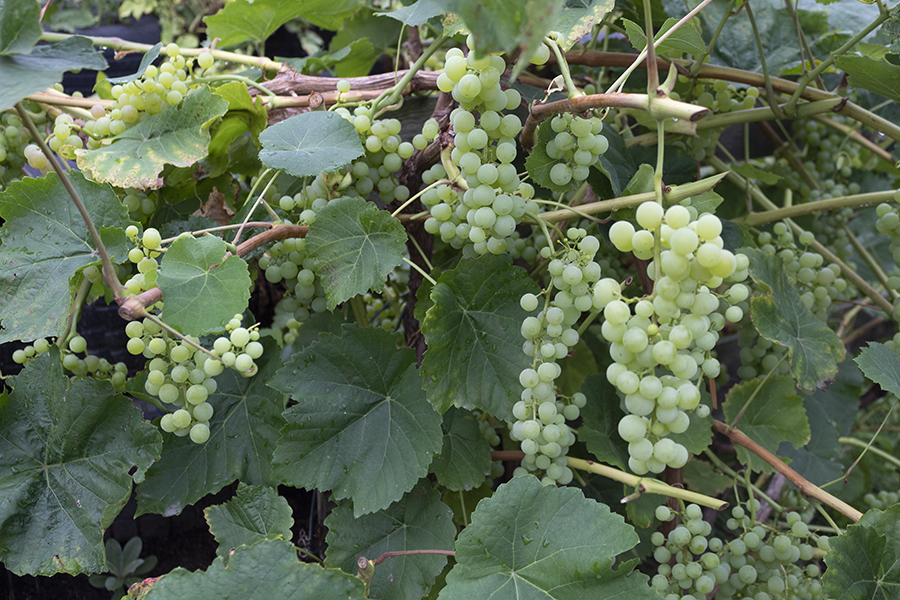I had the pleasure of participating in a balcony farming workshop hosted by the urban farm in July, and took home my own little patio garden filled with jalapenos, baby tomatoes, chives, and parsley, which I’ve been munching on ever since. When I signed up for the workshop, I thought it would be a good chance to get my hands dirty, and I would walk away with a cute little plot of veggies to take care of, but I didn’t expect that my little garden would be such a delight to have around. As I’m meal planning, I realize that I don’t have to run out to the store to buy onion or herbs; I have some right outside my window. Since my balcony garden brought me such joy, I was inspired to learn more about how our community could benefit from urban farming, so I sat down with the farm manager, Marina Gibson, on a sunny day in August.

The farm plot is the brainchild of Gibson, who has a degree in agriculture. In the spring of 2015, she became passionate about establishing an urban farm in Abbotsford after seeing a Facebook post about Sole Food Farms, an urban farming project based in Vancouver. After doing more research, she put together a proposal and started knocking on doors until she eventually connected with Archway Community Services. She introduced her idea and inquired about the possibility of obtaining some land to see it come to fruition.
“I’ve always felt that it was divine inspiration, because the timing was perfect. When I knocked on their door was about the time where they’d already been having some meetings saying we have this bare land, we’d love to do something green, we don’t have anyone to do that for us, and we don’t know what it would look like,” Gibson said when we sat at the picnic table on the farm.
Since then, the connection between them has remained strong, and the farm has been thriving for the past four years. Gibson works on the farm as a full-time volunteer, spending about 900 hours there each season to keep it up and running.
“It’s been an amazing partnership, in large part because what community service does and where my heart lies just intersect really well.”
She’s enthusiastic about the preservation of local food production and believes that connecting people to their food will help them realize the value of local farming.
“We’re surrounded by agricultural reserve land, so we have to preserve that land. We can’t give away our food security to other countries, but we’ve got such a population demand on space, it drives the prices [of the land] up. So, how do you justify holding all that land when you could build on it? The reality is we need to eat food; people need to see what it takes to grow food. People need to connect to the fact that fresh food tastes better, it’s healthier — there’s so many benefits to having local food.”


She’s concerned about the state of global food production and explained that there are a lot of things coming down the pipe that may threaten our food security. The compounding effects of climate change on food security include water shortages, soil erosion, the monopolization of production by corporate entities, genetic pollution, loss of biodiversity — the list goes on. Gibson said that while there is a need and a place for intensive agriculture and global production, it’s still important to foster a connection between people and their food.
“This isn’t going to feed the world, but it has a place and a purpose within the larger framework of feeding people.”
Gibson explained that the goal of the farm was to establish a learning space along with a social enterprise — a business that focuses on social well-being, while also being able to cover its own costs and hire staff members on a full-time basis. For that, they require a physical expansion so they can grow more produce to sell, because they can’t grow enough to support the full vision on their current plot of land. Gibson said that while the city is on board with the growth of urban agriculture, it’s just a matter of practicality for securing a larger space.
At its core, the initiative of the project is to help the city’s most vulnerable. Gibson explained that a men’s addiction recovery house comes to the farm for a few hours every week. She said that the biggest impacts of the farm take place in one-on-one conversations with residents; they can benefit from a community garden, not just by consuming locally grown, healthy food, but because of the connection to a green space and to life. She believes the farm carries with it informal therapeutic benefits.
“Last year there was a fellow who stopped by the gate, and he just kinda said he likes to look at the space. And we got into a discussion because his story was that his wife had died a few years back. He felt bereft in life and unanchored and also felt worthless because of having lost that relationship, and how much it knocked him back. So now he was street-entrenched. Just connecting and speaking is part of that community outreach. So that’s what I mean when I say I want people to be able to connect to life: that they can look at the greenery; they can look at the lushness.”
We spoke about the recent changes happening in Abbotsford’s downtown core, and how urban farms may be able to help combat some of the negative effects gentrification could have on residents. The farm could not only act as a therapeutic space, but as a way to reclaim space that is being taken over by modernization initiatives.
“I think it’s just that greenness, in amongst the whitewash, in amongst the asphalt, all the concrete, busyness, harshness that you have day to day — [it’s important] that you have a place of softness or green. It’s not forest-bathing, but it’s still nature-bathing by just being here.”
It was clear that the farm was a place for community. As recent UFV graduate Lorenzo Bonetti and I sat down to discuss his experiences on the farm, a student there as part of the Canada Summer Jobs program puttered around. Bonetti graduated from UFV in 2018 with a sociology/anthropology degree, and became interested in urban farming after taking a workshop with Archway Community Services on urban food security and food sovereignty. He was hired onto the urban farm as an agricultural intern for the season, and has been loving it ever since.
“We’re surrounded by some of the most productive and luscious agricultural land in all of Canada, but there’s still people that live in the city that are removed from that — [from] things grown with a little bit more intention.”
He said they’re not asking the cities to take on urban farming initiatives themselves; rather, they could build a path for citizens and nonprofits to take charge and do things themselves, whether financially or in terms of land. Bonetti explained that agriculture is often focused outside the city centres, but that it runs in the veins of Abbotsford. The City of Abbotsford’s current community master plan, Plan for 200K, recently launched an online survey initiative that makes it easy for citizens to give feedback on projects.
“Abbotsford, I think, has taken a really positive step in some of that community planning, even in terms of community engagement.”
He said that the best thing for cities to do is support their citizens in the process of reclaiming their passions — food production included.
“There are people passionate in the City of Abbotsford about so many different topics and initiatives, and that passion is really what drives community. So instead of the city going out of its way to do those things because it’s what the people want, find ways to support your citizens. Allow them to flourish and build those things.”
Images: David Myles/The Cascade
Darien Johnsen is a UFV alumni who obtained her Bachelor of Arts degree with double extended minors in Global Development Studies and Sociology in 2020. She started writing for The Cascade in 2018, taking on the role of features editor shortly after. She’s passionate about justice, sustainable development, and education.


